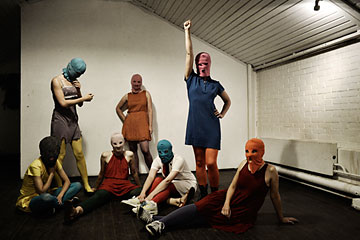
Members of the dissident punk collective Pussy Riot plan their next performance at a Moscow hideout. Three members were arrested earlier this year.
(2 of 3)
In a speech he gave on Sept. 12, about a week before the Duma put the amendment to a vote, Putin argued that Russia was engaged in an "open battle" with foreign powers over "the spiritual and moral values" of the nation. The weapons in this fight were "well-orchestrated propaganda attacks" from abroad, and if Russia did not counteract them, they could lead to "ultimate collapse, the loss of sovereignty and wars of brothers killing brothers." The once and current President cast the threat in absolutist terms. "[Their] attempts to influence the worldview of entire nations," he said, "to bend them to their will, to force upon them their system of values and outlooks is an absolute reality, just like the battle for natural resources."
Within hours of this speech, it became clear which enemies Putin had in mind. The development arm of the U.S. State Department, USAID, was ordered that day to pack up and ship out of Russia by the end of the month. The agency had spent two decades and some $2.7 billion developing Russian civil society, financing everything from election observers to health programs, and its expulsion was the worst diplomatic snub Moscow had dealt Washington since the end of the Cold War. The insult seemed calculated. As one Russian pundit described it: "Putin has publicly wiped his feet on Obama's jacket."
Moscow appeared to have been building toward such a decision since the start of Putin's re-election campaign. A mass opposition movement, mostly from among the urban middle class, had sprung up last winter to oppose his return to the Kremlin. After the first major street protest in December, Putin accused U.S. Secretary of State Hillary Clinton of giving "the signal" that started the demonstrations against him. Anti-Americanism quickly became a central theme of his campaign and continued after Putin's election in March. One of the progovernment networks, NTV, showed such an uncanny ability to predict U.S. Ambassador Michael McFaul's every move that he seemed to suspect he was under surveillance. "Do they have a right to read my e-mail and listen to my phone?" McFaul tweeted in March.
McFaul's suspicions, which NTV denied, point to a unique aspect of surveillance in Russia — the government's ability to coordinate the work of state-run media and the legislature, as well as law-enforcement and spy agencies. The teamwork seemed evident in early October, about a week after the vote on the treason amendment, when NTV ran a documentary accusing various opposition leaders of treason. The film included footage from another surveillance camera that showed Sergei Udaltsov, a leader of the anti-Putin protests, sitting around a table with a few of his comrades from the opposition. "It is not out of the question that they were plotting a terrorist attack," the NTV voice-over suggests, switching to stock footage of an explosion. In the final frames, the narrator asks the police to investigate Udaltsov and his fellow activists for treason. Sure enough, the prosecutor general soon got to work, filing criminal charges for "inciting mass arrest" against Udaltsov and two other activists from his Left Front opposition group. They all denied the charges, but if the treason amendment is approved in time, they could be the first ones charged under the new statute.
One of the accused, a union organizer from the Left Front named Leonid Razvozzhayev, fled to the Ukrainian capital of Kiev on Oct. 16, the day before official charges were filed against him. In Kiev he applied for political asylum at the U.N. agency for refugees. When he stepped outside the agency's office for a coffee break, however, he was kidnapped by four men, bundled into a van and driven back across the Russian border. He appeared three days later at Moscow's Lefortovo prison, having apparently signed a 10-page confession for "organizing mass unrest." According to the statement he made to rights workers in prison — as relayed independently to TIME by those workers — the confession was extracted through torture. He said he was held in a basement for almost three days without food, threatened with the murder of his wife and young children and forced to read his confession in front of a video camera. The four men who held Razvozzhayev in that basement never identified themselves, but once they had secured his confession, he says, they handed him over to the Russian police, who took him to prison. Although the U.N. demanded an investigation into the alleged kidnapping in Kiev, Russian investigators have denied Razvozzhayev's version of the story, saying he turned himself in to police in Moscow and voluntarily confessed to "get it off his chest."
Valeri Borschev, one of the human-rights activists who met Razvozzhayev in prison, says his case marks a paradigm shift in Putin's Russia. "What we're seeing is a return to methods of repression perfected under Stalin," he says. As for Udaltsov, he expects to be arrested soon as well. "Their surveillance is unconstitutional," Udaltsov told me by phone on Oct. 16, the day before he was charged. "They did not have the right to film me in that conference room. I wasn't under investigation for anything." Sweeping his apartment for bugs, says Udaltsov, has become "part of my routine now. But you can't check every single place you have a meeting. Eventually you just start to assume that they're watching at every moment."
